Contact us today.
Our global experts are ready to help your business. Get in touch with one of our representatives today.
Send messageHistorically low unemployment has turned the tables on employers. Talented candidates can be picky, and Millennials are ready to work hard for organizations that understand how they learn, what motivates them, and what they want most from the job.
Modis has made it part of our mission to improve youth employment rates and to help employers integrate this talent into their workforce. To that end, we conduct an annual survey aimed at identifying what emerging professionals really think about work. Employers who want to get the most out of Generation Now (our term for Millennials and Gen Z) are going to need that insight.
Students surveyed responded that they would spend more time on activities other than job searching over spring break, such as spending time with family and friends, watching television or streaming TV shows, and spending time on social media. Responses indicated that over 90% of participants would spend time on the aforementioned activities before allocating time for their job search. However, over half (61%) did indicate that they would spend time looking for jobs. The average time spent on the job search is 2.1 hours, compared to 7.6 hours with friends and family, 6 hours of watching/streaming television shows and movies, and 4.5 hours on social media.
Only 16% of students responded that they would be spending over 5 hours on their job search. On the other end of the spectrum, 39% responded that they would not be spending any time on their job search over Spring Break.
Overall, Millennials and Gen Z are most likely to use their university career center or online job boards when searching for a job. No other tool, including their personal network, comes anywhere close. It makes sense, because Gen Now hasn’t been in the workforce long enough to acquire networking skills or establish strong professional relationships.

Job hunting can be scary, but job boards are ubiquitous and generally easy to navigate, while the career center represents familiarity. A friendly counselor who provides guidance and encouragement is a definite plus. Those looking to hire Millennials and Gen Z should keep these qualities in mind, facilitating a simple and approachable apply process that integrates technology and a friendly face.
Despite any rumors to the contrary, job boards are alive and well. However, college career centers are trusted sources of advice and guidance. Meet job seekers where they are by developing partnerships with colleges and university career centers by regularly communicating job openings. Attend college career fairs or tap into organizations who regularly cultivate these relationships.
Take full advantage of job boards by creating smart, informative ads that give future employees an intriguing taste of what it would be like to work for your company. Finally, if Millennials won’t come to the mountain … well, you know the rest. Teach Millennials and Gen Z to more greatly value networking by ramping up your employee referral programs, effectively encouraging your staff to go out and bring Gen Now to you. Hiring an employee who’s been vetted by another trusted worker has clear advantages.
Most students expect their job search to take 5 months or less, which is consistent with last year’s survey findings. Some students expect the search to take 6-12 months, and a few expect to be in the market for more than 12 months.
Only 16% of students responded that they would be spending over 5 hours on their job search on their Spring Break. On the other end of the spectrum, 39% responded that they would not be spending any time on their job search over Spring Break.
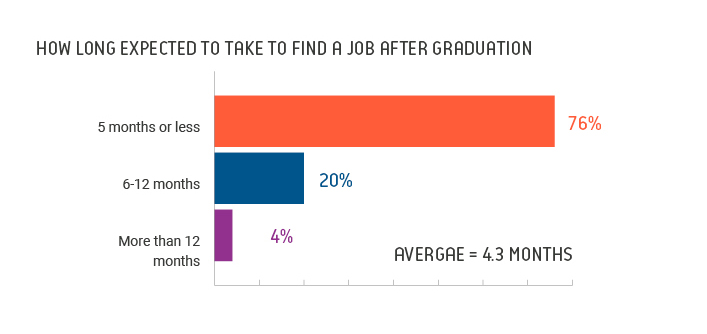
With many employers desperately in need of talent, Millennials and Gen Z can’t be faulted for expecting their job search to be completed in a few months. However, time to fill has been lengthening as employers drag their heels while refusing to modify their hiring processes2.
Facebook and LinkedIn are the two most popular social media platforms for researching potential employers, hands down.
The internet works both ways. Just as employers are checking out job seekers on the web, Gen Now uses the web to gauge your company culture. Protecting your brand and presenting yourself as an employer of choice will help you attract the best talent.
Use social media to engage potential employees. Post news, informative articles, surveys, and links to your open positions on Facebook and LinkedIn. A word of caution, social media management is a full-time job. If you haven’t already, invest in a talented individual or team of individuals who can manage your digital presence.
Most of Gen Now is hopeful about the future while realistic about the effort required to land a good job. They’re prepared to do what they must to meet their goals. Most students feel either “determined” or “optimistic” about their job search. Very few have a negative attitude, going so far as to say they feel “defeated.” And fewer students felt “defeated” about their job search as opposed to last year’s survey.
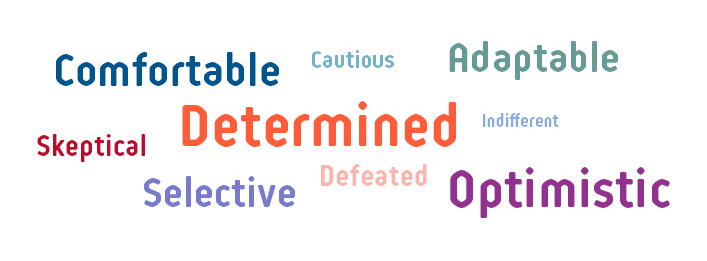
These young job seekers are serious about securing a good position. Earn their respect early on in the hiring process by distinguishing yourself as a no-nonsense employer who appreciates candidates’ time and effort. It is important to respond to applications quickly, schedule interviews promptly, and follow up as promised.
Be prepared to engage with Millennials and Gen Z as you would any other ambitious adults. Expect to negotiate wages and benefits and to answer pointed questions about job requirements, opportunities for pay increases and promotions, and the work environment.
Gen Now is establishing its financial independence. They need cash to pay rent, cover living expenses, repay student debt, and prepare for the future. We learned that their number one focus is finding a job, followed by developing workplace skills. While psychological and physical wellness was not the number one concern, these young adults value balance and want to remain healthy.
Millennials and Gen Z are concerned with finding a job, paying for their education, obtaining personal and financial health, and paying for a place to live on their own after graduation.
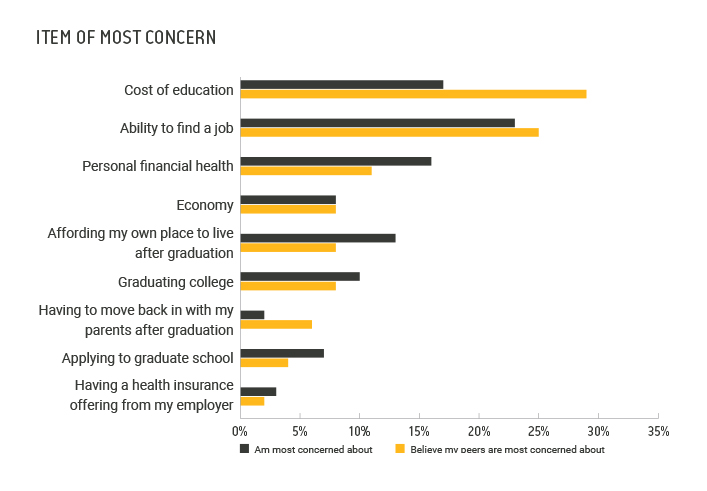
Millennials and Gen Z are focused on securing gainful employment post graduation. They want to put their education to use and contribute to society, of course, but they also want to make money and establish themselves as independent adults.
Sure, you could scoop them early without much effort but don’t assume they will stick around. Show yourself as an employer of choice by offering Gen Now fair wages and plenty of chances for advancement and opportunities to learn. While these workers may accept jobs paying entry-level wages, they’ll expect to achieve upward mobility rather quickly through regular raises and promotions. Any job that doesn’t provide as expected will be viewed as a mere stepping stone until something better comes along.
Because the Affordable Care Act allows individuals up to age 26 to remain on their parents’ medical plans, Gen Now is relatively unconcerned about health insurance and more focused on other coveted benefits, such as flexible work schedules and paid time off. Stretch your benefit dollars while providing maximum value by offering enticing opt-out incentives or true cafeteria style plans that allow employees to “mix and match” benefit options to suit their needs.
When it comes to assisting Gen Now to obtain personal and financial health, there’s a lot employers can do. Consider offering unusual benefits like first-time homeowner assistance, student loan forgiveness, or onsite yoga as well as more traditional benefits like employee assistance programs. If your company can’t afford to pay for these benefits, suggest cost sharing or investigate employment solutions that can shoulder the burden of benefits.
Most Millennials think their peers are concerned about the cost of education first and finding a job second. This is the complete opposite of what our survey showed.
Now that more Millennials have already secured their first job, paying down student loan debt is top of mind. Many employers distance themselves from this portion of their employee’s lives. Financial stress affects productivity3 and offering student loan repayment4 or financial education benefits can attract top candidates, boost productivity, increase retention and encourage loyalty and serve as a true differentiator.
Ask an expert to perform an in-depth review of your company’s total compensation package. Even fairly modest benefits like free lunch on Fridays or vouchers for public transportation will be appreciated by workers looking to reduce costs.
Last but not least, don’t underestimate the importance of the dollar. For young workers, attaining financial independence to key. Use short- and long-term financial incentives to motivate good performance and increase retention.
Despite their years of schooling, Gen Now isn’t necessarily prepared for work. Many feel that their colleges and universities simply aren’t preparing them for real work. Most students have gained exposure to the workplace through internships and other pregraduate opportunities, but they are looking for more.
74% of students believe their college/university is failing them in some way when it comes to job preparation, and 32% believe the worst offense is not teaching applicable “real life” business skills
Millennials and Gen Z are eager to obtain “real life” business skills, and employers who deliver can distinguish themselves from the crowd while taking intelligent steps to improve their employees’ performance.
Connecting Gen Now with training in key skills such as conflict resolution, communication, and emotional intelligence can add real value to their post collegiate experience. Many employers reimburse employees for college/continuing education courses they can research and attend on their own time. If this isn’t an affordable option for your organization, simply pointing Gen Now to free or low cost options for professional development can make a huge difference.
Mentoring programs that pair workers in the early phase of their careers with workers who have more experience are valuable too. Let’s be honest, the world of work has its own culture, and many of the unwritten rules can only be learned through trial and error. A supportive guide helps.
Most students (68%) have held (or expect to hold) one to four jobs or internships before graduation.
The majority of Millennials and Gen Z want exposure to the job market pregraduation, but they’ll consider post-graduation internships as well. Leverage their enthusiasm by developing meaningful internship programs that’ll give you a chance to mold the future workforce while giving them invaluable work experience. To attract the broadest base of talent, pay your interns a fair entry-level wage. Accept that younger workers view “job hopping” pragmatically and likely the only way to achieve higher wages and more responsibilities. If you’d prefer to keep your talent close, provide ongoing feedback, regular development prospects, and regular pay increases.
What Gen Now wants most in a first job is opportunity for growth. They enjoy learning and want work that improves their skills and holds their interest. They definitely don’t want to be bored, but passion is less important than avoiding layoffs and other shake-ups that have the ability to affect their short- and long-term financial goals.
Above all, most Millennials and Gen Z’ers want a first job to provide growth opportunities. Job stability, fulfilling work, a friendly work environment, flexible hours, and a high salary are much further down the list.
Millennials and Gen Z value new experiences and skill-enhancing projects that provide interest and increase their marketability. Employers who want their younger employees to stay engaged will keep the job varied and challenging.
Stay on top of Gen Now’s career goals and aspirations. Effect management will encourage them to share strengths and weaknesses, give them opportunities to assume more responsibility, demonstrate willingness to listen and participate in their development. Those simple steps will go a long way toward securing Gen Now’s loyalty and engagement.
Whenever possible, let them lead. Gen Now is well equipped to introduce new technology to the company, participate in process improvements, or head a focus group or committee.
Remember that even though stability and fulfilling work may be of less concern to Gen Now in their first job than opportunities for growth, these are still important, and you’ll get the most from your workforce when you meet as many of their needs as possible.
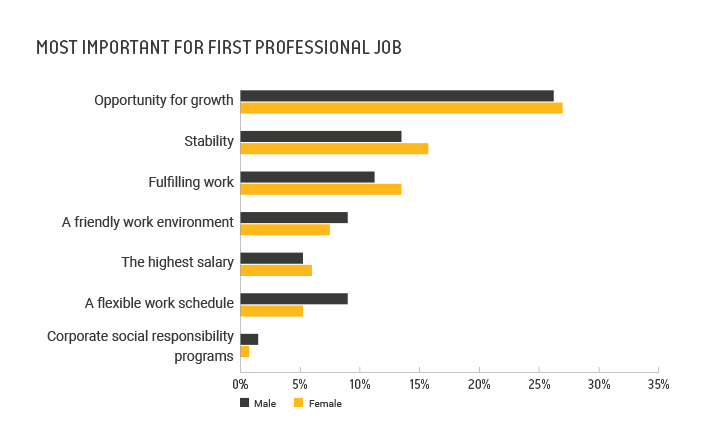
More than two out of three Millennials and Gen Z’ers would prefer stability over passion in a job.
Gen Now wants job security, period. They’ve seen their parents, older siblings, and older friends struggle through the Great Recession, and they’d rather not go through that. Unlike the Boomers and even more than Gen Y, Millennials and Gen Z know the importance of forming an identity aside from what they do to make money.
Gen Now looks to work for stability and seeks passion in their personal lives. The proliferation of technology in their childhood has hardwired efficiency into their workflow. To put it simply, they type faster, use time management applications, navigate new software more easily and are regularly exposed to new processes. As a result, your young employees want to devote more time to personal pursuits and they don’t care who knows it.
Many employers struggle to understand and accept this worldview. Respecting their perspective while evaluating their value against a fair standard can smooth potential conflicts. Passion in the workplace may be overrated. Every company needs good, solid performers committed to getting stuff done without all the drama.
Invest in an emotionally healthy work environment that provides a measure of emotional safety and comfort. Over-the-top conflict, dysfunctional teams, and inconsistent management will upset anyone’s confidence in the organization and lead to an overall feeling of angst, which is the opposite of what your young workers want to feel5.
Gen Now is looking forward to being settled in a great job with great pay and benefits and sharing that good fortune with a partner. While they admire entrepreneurs and aspire to lead, relatively few are planning to start their own businesses6.
Gen Now aspires most to attaining financial stability, having a dream job, and getting married. However, paying off student loans is top of mind for many. Only a few consider entrepreneurship to be one of their greatest aspirations.
Gen Now is focused on financial independence and security, but they’re not exclusively career minded.
Market-rate wages is one way a job can contribute to the financial health of employees. Stable, transparent leadership is another. Commit to providing your employees both.
Because much of Gen Now is still making its way in the world, employers should expect and embrace a certain amount of “disruption” as younger workers get married for the first time and start their families. Employees who grant flexibility will gain and loyalty in spades.
A true “dream job” may be more fantasy than reality. Listen, teach, set clear expectations, give them room to fail, give them tools, and above all, show appreciation. If nothing else, you’ll turn yourself into a dream boss.
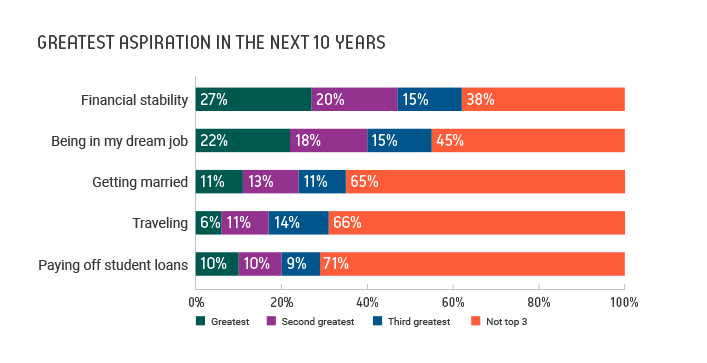
90% of Millennials and Gen Z’ers agree strongly or agree somewhat that a college degree is a must have for anyone hoping to obtain a well-paying job. Only 2% strongly disagree.
We can debate whether students are actually learning7, but there’s no question the population will continue to pursue formal education as a precursor to securing a good job. Show employees the value of industry specific education by linking bonuses and pay raises to credentials, certifications, and licenses obtained post-hire.
The majority of Millennials and Gen Z intend to enter the workforce full-time after graduation, but nearly a third intend to work part-time while pursing an advanced degree.
The Affordable Care Act, which categorizes full-time employees as working 30 hours per week, has already challenged employers to think more carefully about how to structure their benefits to advantage. The trend toward advanced education offers yet another incentive.
Here’s the thing. You need part-time employees and part-time employees need you. Develop your total compensation to entice the best talent to spend a little time with you now and more time with you later.
Be fluid. New ways of working are here. Offer part-time employees the flexibility to get work done anywhere and anytime. Be sensitive to the challenges of diverse work teams. Develop policies and procedures that encourage your onsite/offsite and full-time/part-time employees to work together productively and peaceably.
Millennials and now Gen Z may well be the most researched and talked about generations ever. Their numbers are legion, their attitudes are legendary, and their impact on your workplace can’t be underestimated.
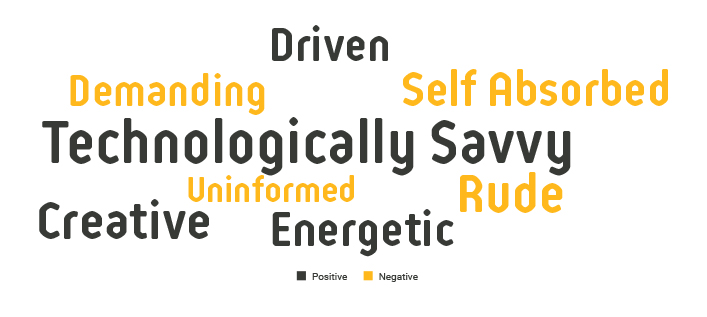
Millennials and Gen Z have their own ways of doing things, and total conformance to established workplace norms is probably not likely. Respectful give and take, which ultimately results in a better workplace, is the way to go.
Capitalize on young workers’ technological savvy, but don’t be disappointed if they can’t answer all your tech questions. Stereotypes are ultimately limiting. When interacting with Gen Now, keep any biases in check and be open to discovering each individuals’ unique strengths and weaknesses. Remember, every generation has its detractors, but we’re all more than the sum of our parts.
Millennials and Gen Z generally aren’t squeamish about closing up shop, packing their bags, and putting down stakes somewhere new. They’re adventurous and practical in equal measure. If what they want is a state or two away, they’re prepared to go and get it. Employers in the biggest cities with a reputation for opportunity and excitement have an edge, as do companies located in the suburbs, but overall, these workers don’t care where they work as long as their needs are being met.
In Gen Now, employers have a group of employees willing and ready to move just about anywhere, anytime for the right reasons. That’s good news for national and international companies or those looking to expand into broader markets.
Capitalize on this willingness by offering solid prospects and solid relocation packages. Of course, knowing your markets is key, because determining fair compensation and benefits in light of a relocation can be tricky. Be sure your offerings are in line with the cost of living and workers’ expectations.
Communicate to workers the benefits of your location, wherever that may be. Conversely, employers should compensate for the downsides of a particular locale.
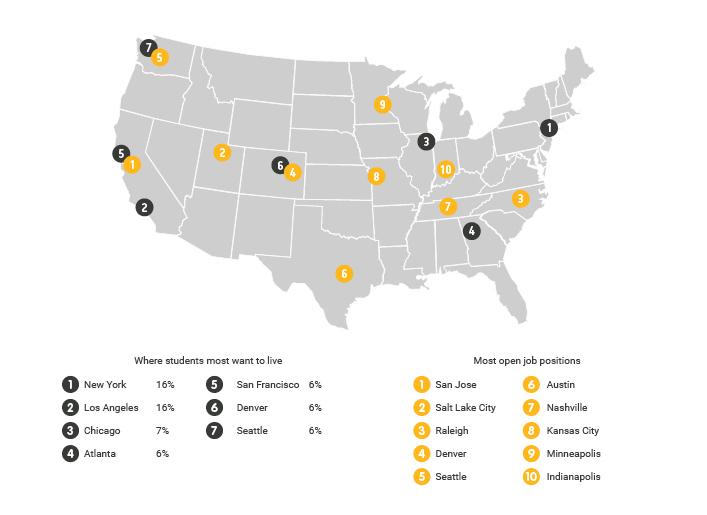
More than 2,000 companies and government entities throughout North America rely on us each year to connect them with quality IT and engineering professionals who are ready to work. We help our clients accomplish their business objectives through our contract, contract-to-hire and direct-hire staffing services, as well as our managed staffing/SOW-based solutions.
Together with Adecco, we provide services in more than 60 countries on six continents, and in each of the 48 contiguous United States and throughout Canada. We currently supply over 150 IT and engineering job categories that encompass hundreds of specific IT and engineering skillsets. Our ability to support our clients’ dispersed skillset and geographic staffing needs is second to none in the industry.
Sources